Freezing temperatures and snowfall continued across parts of the UK on Wednesday morning as weather warnings remain in place in all four nations.
Yellow warnings for ice and snow are in effect following the first snowfall of the season, which caused more than 200 schools to close on Tuesday.
Icy conditions prompted warnings vehicles could be stranded, power cuts may occur and rural areas could be cut off.
National Rail advised passengers to check their journey before travelling.
Temperatures widely dropped to between -1C (30.2F) and -4C (24.8F) across the UK on Wednesday morning, getting as low as -7.8C the Grampians, Scotland, and -7C in Shap, Cumbria.
Further heavy snow fell in northern Scotland overnight, while north Wales and the midlands also woke up to fresh snow on the ground.
Yellow weather warnings are in place for parts of all UK nations.
For much of England, including much of the south and West Midlands, an ice warning is in place until 10:00.
A snow and ice warning along the east coast of England – from East Anglia up to north of Newcastle-upon-Tyne – will be in effect until 12:00.
Most of Northern Ireland and Wales are also under a yellow warning for snow and ice until 10:00.
The Met Office has issued a new yellow warning for snow and ice across parts of northern Scotland and its west coast, which will last from 10:00 on Wednesday until 12:00 on Thursday.
A yellow warning means it is likely that the weather will cause disruption to travel, and there is a danger of slips and falls on icy ground.
In north Wales, trains were suspended between Llandudno and Blaenau Ffestiniog until about 07:30, with delays on the line expected until 09:00.
In Northern Ireland, Translink has warned of disruption to some services in the Magherafelt and Cookstown areas, including school routes, due to road conditions.
ScotRail has said it was struggling to source rail replacement transport due to the weather, after a fallen tree caused disruption to some services in and out of Aberdeen – but tickets are valid on existing Stagecoach North services.
Meanwhile, more than 40 schools in Scotland, almost 50 in Wales and at least 30 in England are shut due to frosty conditions.
More snow is expected in parts of Scotland, north Wales and also over higher ground of eastern England throughout the day, with motorists warned of potential icy conditions.

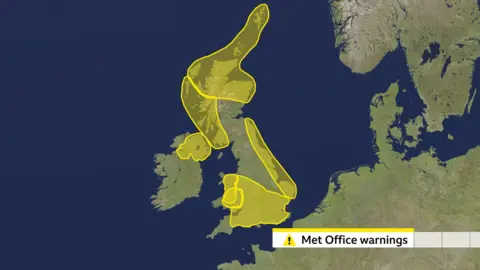
Temperatures in the coming days will be much lower than the mid-November average by day – and are expected to fall below freezing by night.
They are predicted to drop to -2C in London on Friday, -4C in Birmingham and -7C further north.
The average November temperature for London is 11C during the day and 5C at night.
On Monday, Scotland had its coldest early winter night since 1998, with temperatures in Braemar in Aberdeenshire reaching a low of -11.2C.
Elsewhere in Aberdeenshire, a bus ended up on its side in icy road conditions in the New Leeds area. There were no injuries.

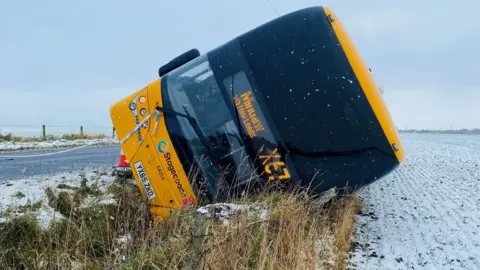
The RAC said Tuesday’s snow was the “first taste of winter” for many drivers, with “some of the worst road conditions we’ve seen all year”.
Spokesperson Alice Simpson said: “Everyone should travel prepared in case they find themselves broken down at the side of the road: a blanket, warm waterproof coat and gloves, sturdy footwear and a charging cable and mobile power bank are all essentials.”
Snow caused travel problems in Wales with the A44 in Powys becoming impassable and crashes on snowy roads closing the A55 eastbound at Caerwys in Flintshire.
Transport for Wales said 13% of its services had been disrupted by severe weather.

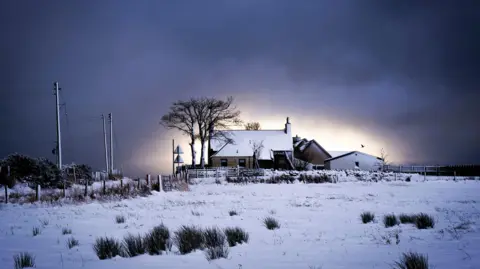 PA Media
PA Media

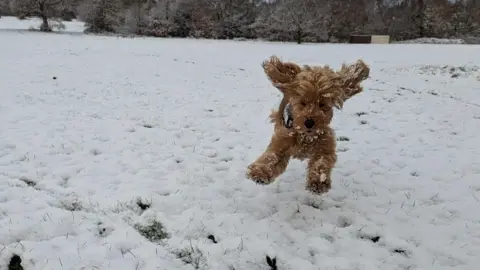 Laura Sabourn
Laura Sabourn
The UK health security agency (UKHSA) has issued an amber cold weather health alert for the east of England, East Midlands, West Midlands, North East, North West and Yorkshire and the Humber.
This means that there is an increased risk to vulnerable people, with a warning that the weather could have an impact on the whole health service.
“It is vital to check in on vulnerable friends, family and neighbours to ensure they are well prepared for the onset of cold weather.
“Particularly if they are elderly or otherwise at increased risk,” Dr Agostinho Sousa, head of extreme events and health protection at UKHSA, said.
As the weather turns colder, some people may be eligible for cold weather payments – a government benefit top-up to help with fuel bills during times of exceptionally cold weather.

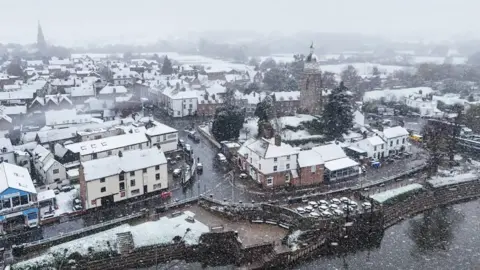 PA Media
PA Media

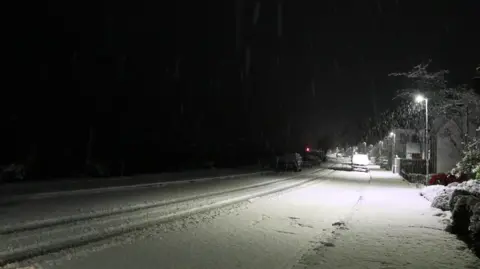 Ingrid/BBC Weather Watchers
Ingrid/BBC Weather Watchers








